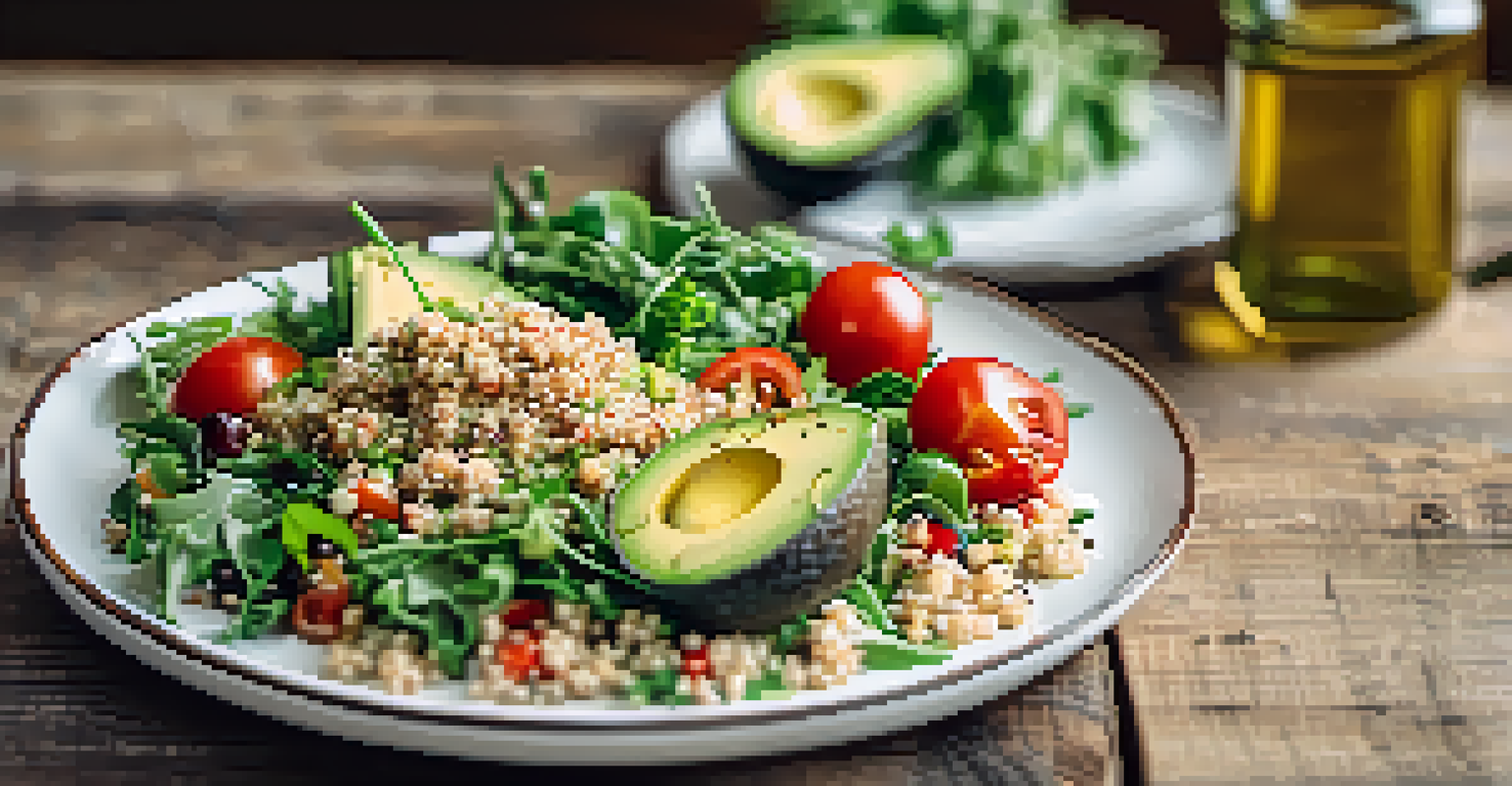Whole Foods vs Processed Foods: Making the Right Choice

Understanding Whole Foods and Processed Foods
Whole foods are foods that are minimally processed and free from artificial additives. Think of them as nature's original recipes, where ingredients are as close to their natural form as possible. Examples include fruits, vegetables, whole grains, and legumes.
Let food be thy medicine and medicine be thy food.
On the other hand, processed foods have undergone alterations that often strip away nutrients and add unhealthy components. This category can range from slightly processed foods like frozen veggies to heavily processed snacks filled with preservatives, sugars, and unhealthy fats.
Understanding the distinction between these two categories is crucial for making informed dietary choices. By prioritizing whole foods, you're more likely to nourish your body with essential vitamins and minerals, setting the stage for better health.
The Nutritional Benefits of Whole Foods
Whole foods are packed with vital nutrients that support our overall health. They typically contain higher levels of vitamins, minerals, and fiber compared to processed options. For instance, a fresh apple provides more nutritional value than a packaged snack bar that claims to be healthy.

Moreover, whole foods are often rich in antioxidants, which help combat oxidative stress in the body. This means that by choosing foods like berries and leafy greens, you're not just filling your stomach; you're also protecting your cells from damage.
Whole Foods vs. Processed Foods
Understanding the difference between whole foods and processed foods is essential for making informed dietary choices.
Eating a diet rich in whole foods can lead to better digestion, improved energy levels, and reduced risk of chronic diseases. It's like giving your body the fuel it needs to thrive rather than just getting by.
The Hidden Dangers of Processed Foods
Processed foods can be deceptively appealing, often marketed as quick and convenient options. However, they frequently contain high levels of added sugars, unhealthy fats, and sodium, which can lead to various health issues. For example, many breakfast cereals are loaded with sugar, making them more like dessert than a healthy start to your day.
You are what you eat.
Additionally, the long shelf life of processed foods often comes at the cost of nutritional quality. While they might be easy to grab on the go, they often lack the essential nutrients your body craves, leading to a cycle of hunger and overeating.
Over time, a diet high in processed foods can contribute to weight gain, heart disease, and diabetes. Understanding these risks can empower you to make better choices and prioritize your health over convenience.
How to Incorporate Whole Foods into Your Diet
Incorporating whole foods into your diet doesn't have to be overwhelming. Start by gradually replacing processed snacks with whole food alternatives. Instead of chips, try air-popped popcorn or a handful of nuts for a satisfying crunch.
Planning your meals can also make a significant difference. Preparing dishes that feature whole grains, fresh vegetables, and lean proteins means you're more likely to eat healthily throughout the week. Think of hearty quinoa salads or stir-fried veggies with brown rice.
Benefits of Whole Foods
Whole foods are rich in nutrients that support overall health, leading to better digestion and reduced disease risk.
Lastly, don’t shy away from experimenting with new recipes. The beauty of whole foods is their versatility, allowing you to create delicious meals that nourish your body while satisfying your taste buds.
Reading Labels: Navigating Food Choices
Understanding food labels is essential in making healthy choices. When shopping, take a moment to read the ingredient list; if it contains items you can't pronounce or recognize, it’s likely processed. Whole foods, in contrast, should have minimal ingredients, often just one or two.
Look for products that are labeled as organic or non-GMO, as these terms typically indicate fewer artificial ingredients. However, remember that not all processed foods are created equal—some can still fit into a balanced diet if chosen wisely.
Don’t just rely on marketing buzzwords; instead, educate yourself on what to look for. Armed with this knowledge, you’ll be better equipped to navigate the grocery store and make choices that align with your health goals.
Balancing Whole Foods and Processed Foods
While whole foods should be the foundation of your diet, it's important to recognize that processed foods can have a place in moderation. Life can be hectic, and sometimes convenience is necessary. The key is to find a balance that works for you.
For instance, if you’re short on time, opting for frozen vegetables or canned beans can provide nutritional benefits while saving you time in the kitchen. These options can still be healthier than many heavily processed snacks.
Mindful Eating for Balance
Incorporating whole foods while allowing for processed options in moderation can help maintain a balanced and healthy diet.
Ultimately, it’s about making mindful choices. By being aware of what you’re consuming and aiming for a higher ratio of whole foods, you can enjoy the best of both worlds while still prioritizing your health.
The Impact of Whole Foods on Mental Health
Interestingly, the foods we consume not only affect our physical health but our mental well-being as well. Studies suggest that a diet rich in whole foods can enhance mood and cognitive function. Think of how energized you feel after a fresh salad compared to after a sugary snack.
Whole foods provide the nutrients our brains need to operate at their best. Omega-3 fatty acids from fish, antioxidants from berries, and fiber from whole grains are all linked to improved mental clarity and emotional stability.

Making a conscious effort to include more whole foods in your diet may help reduce feelings of anxiety and depression. It’s a simple yet effective way to nourish your mind along with your body.